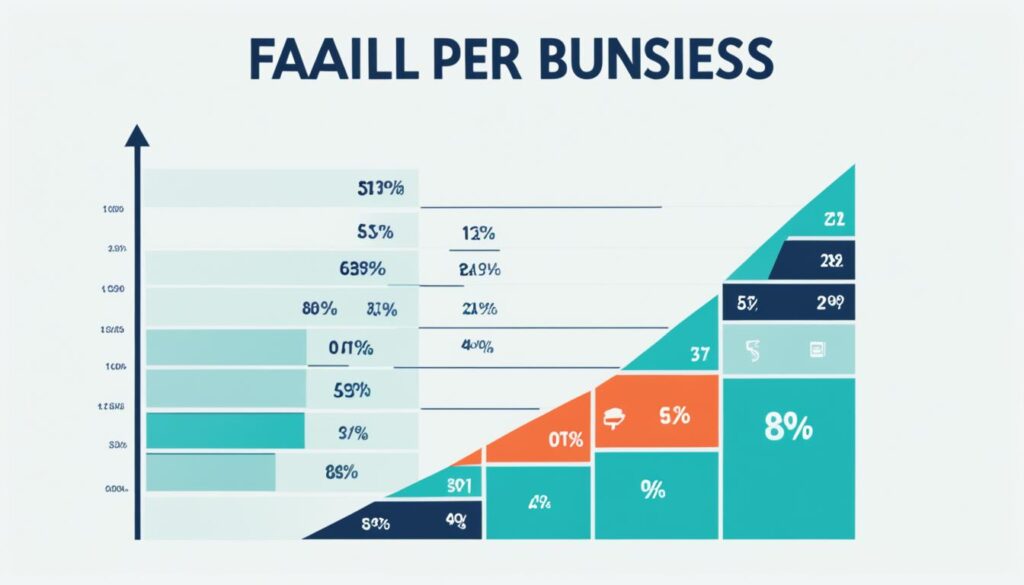Failure is an inevitable part of business. It’s often seen as a negative outcome, but what if we told you that failure can actually be a valuable learning experience? According to Amy C. Edmondson from Harvard Business School, there are different categories of failures, ranging from preventable ones in predictable operations to intelligent ones at the frontier. The key is to effectively learn from failures and use them as stepping stones to success.
Creating a culture where employees feel safe admitting and reporting on failure is crucial. Organizations that embrace failure as a learning opportunity are able to adapt, innovate, and improve. Unfortunately, these organizations are rare, even though the business failure rate remains high. It’s time to change the narrative around failure and start viewing it as a powerful learning opportunity.
Key Takeaways
- Failure in business is not always a negative outcome; it can be a valuable learning experience.
- Creating a culture where employees feel safe admitting and reporting on failure is crucial.
- Organizations that embrace failure as a learning opportunity are able to adapt, innovate, and improve.
- View failure as a stepping stone to growth in business.
- By learning from mistakes, reflecting on what went wrong, and building resilience, individuals can overcome the fear of failure and continue progressing towards success.
Overcoming the Fear of Failure in Business
Many businesses are often plagued by fear when it comes to failure. As a result, they tend to avoid taking risks and miss out on potential opportunities for growth and success. It’s important to understand that failure is not the end but rather a valuable learning experience that can lead to valuable insights and improved strategies.
When faced with failure, it’s essential to reflect on the experience and identify the factors that contributed to the setback. This reflection allows for a deeper understanding of what went wrong and provides valuable lessons to prevent similar failures in the future. By learning from mistakes, businesses can develop effective strategies and make informed decisions to recover and bounce back stronger.
Building resilience is crucial for overcoming the fear of failure. It involves adapting to new challenges, embracing flexibility, and remaining positive and motivated in the face of setbacks. By maintaining a resilient mindset, businesses can effectively navigate through difficult times and come out stronger on the other side.
Another key aspect of overcoming the fear of failure is expanding comfort zones. Stepping outside of familiar territory allows businesses to explore new possibilities and discover untapped potential. Embracing new ideas and taking calculated risks can lead to innovation and provide opportunities for growth and success.
“Success is not final, failure is not fatal: It is the courage to continue that counts.” – Winston Churchill
By reshaping the perception of failure and viewing it as a stepping stone rather than an obstacle, businesses can unlock their true potential. Embracing failure as a learning opportunity fosters a culture of innovation, resilience, and continuous improvement. It allows businesses to thrive in a competitive landscape and reduces the chances of repeating past mistakes.
Remember, failure is not the end of the road but rather a necessary part of the entrepreneurial journey. By adopting a growth mindset, businesses can recover from failure, avoid similar pitfalls in the future, and ultimately achieve long-term success.

| Reasons for Business Failure | How to Recover from Business Failure | Tips for Avoiding Business Failure |
|---|---|---|
| Lack of market research and understanding customer needs | Develop a comprehensive recovery plan, analyze the root causes of failure, seek expert advice and support, and leverage existing resources | Conduct thorough market research, understand customer demands, develop a solid business plan, continuously adapt to market trends and changes |
| Poor financial management and cash flow issues | Implement sound financial practices, seek professional guidance, negotiate with creditors, and explore funding options | Maintain accurate financial records, monitor cash flow regularly, create a financial contingency plan, and establish strong relationships with financial institutions |
| Ineffective marketing and branding strategies | Reevaluate marketing and branding efforts, conduct market research, identify target audience, refine messaging, and leverage digital marketing channels | Develop a comprehensive marketing strategy, establish a strong brand identity, regularly assess marketing campaigns, stay updated on industry trends, and adapt accordingly |
Viewing Failure as a Stepping Stone to Growth
Failure should not be seen as the end but rather as a stepping stone to growth in business. By reframing perspectives, replacing self-criticism with self-compassion, and embracing adaptability, entrepreneurs can turn failure into a launchpad for success.
Reflecting on past failures can provide valuable insights and lessons learned. Celebrating small victories along the way is essential in building confidence and maintaining motivation. Sharing stories of overcoming failure can inspire and encourage others to persevere in their own business endeavors.
“Success is not final, failure is not fatal: it is the courage to continue that counts.” – Winston Churchill
Learning from Failure
Learning from business failure is crucial for long-term success. It allows entrepreneurs to analyze what went wrong, identify areas for improvement, and develop strategies for future endeavors. By recognizing failure as an opportunity for growth, individuals can build resilience and become better equipped to navigate challenges in the future.
Adopting an adaptive mindset is essential in the ever-changing business landscape. Embracing new ideas, technologies, and approaches can help entrepreneurs stay ahead of the competition and capitalize on emerging opportunities.
Success After Failure
Many successful businesses have emerged from failures. Walt Disney, for example, experienced multiple business failures before creating the iconic Disney brand. Jeff Bezos, the founder of Amazon, faced early setbacks but persevered to build one of the world’s most valuable companies.
These examples demonstrate that failure does not define one’s ability to succeed. Instead, it serves as a catalyst for growth and innovation. With the right mindset, lessons learned from failure can pave the way for future success, guiding entrepreneurs towards their ultimate goals.
Failure as a Powerful Learning Opportunity
Failure is not the end of the road in business; rather, it should be seen as a powerful learning opportunity. By shifting our perspectives and embracing failure as a chance to learn and grow, we can unlock new levels of personal and professional development.
Learning from our mistakes is crucial in overcoming the fear of failure and continuing our journey towards success. Reflecting on what went wrong allows us to identify areas for improvement and shape our future actions. It gives us valuable insights into what works and what doesn’t, enabling us to make better decisions moving forward.
No one likes to fail, but building resilience is essential in the face of adversity. Resilience helps us bounce back from setbacks, adapt to change, and stay motivated despite the challenges. It allows us to persevere and find alternative paths to success when our initial attempts have fallen short.
Celebrating small victories along the way is also vital in the learning process. Acknowledging our progress and accomplishments, no matter how small, boosts our confidence, keeps us motivated, and inspires us to keep pushing forward.
“Success is not final, failure is not fatal: It is the courage to continue that counts.” – Winston Churchill
Sharing our failure experiences with others is not only a way to connect and empathize, but also a means to learn from each other. By openly discussing our failures, we create a supportive environment that encourages learning and growth. We can gain valuable insights and perspectives from different individuals, helping us avoid similar pitfalls in the future.
Business Failure Statistics
Understanding the reality of business failure rates can help put failures into perspective and drive our determination to learn from them. According to the Small Business Administration, around 20% of new businesses fail within their first year, 30% within their second year, and nearly 50% within their fifth year.
While these statistics may seem discouraging, they highlight the importance of embracing failure as an opportunity for learning and growth. By actively seeking knowledge from our failures and applying those lessons to future endeavors, we can increase our chances of success in the long run.
| Year | Business Failure Rate |
|---|---|
| 1 | 20% |
| 2 | 30% |
| 5 | 50% |

Conclusion
Failure is not the end, but rather the beginning of something greater in business. It is through failures that we gain invaluable lessons and insights that can shape our future success. By learning from our failures, reflecting on the journey, and embracing the opportunity for growth, we can transform setbacks into stepping stones towards achieving a successful business.
Viewing failure as a learning experience allows us to identify the factors that contributed to the setback and make necessary adjustments for future endeavors. Applying the lessons learned from failures helps us develop resilience, adaptability, and perseverance, which are essential traits for long-term success in business.
By adopting a mindset that embraces failure as a part of the journey and sharing our experiences with others, we inspire and empower those around us to view failure positively. Learning from failure is not only crucial for individual growth, but it also contributes to the overall development of the business community by fostering innovation and resilience.
So, let us not fear failure, but rather approach it with curiosity and determination. Successful businesses are not built solely on achievements, but also on the ability to learn, adapt, and grow after encountering failures. Embracing failure as a learning opportunity enables us to navigate the challenges of entrepreneurship and ultimately achieve success in our business endeavors.






